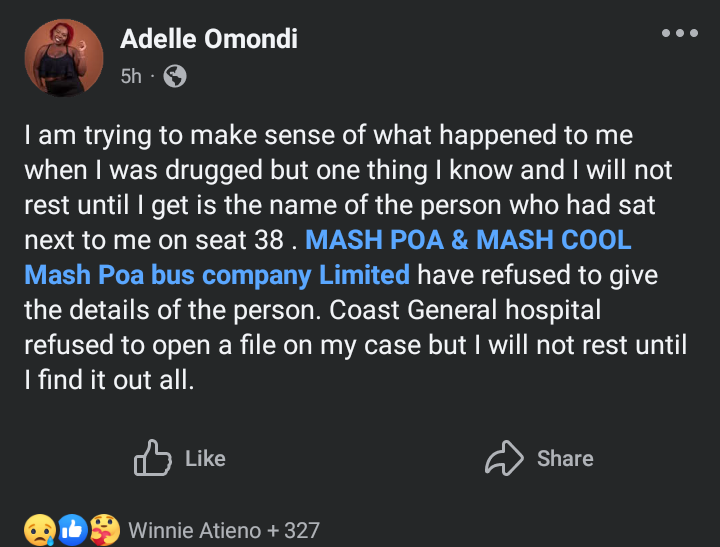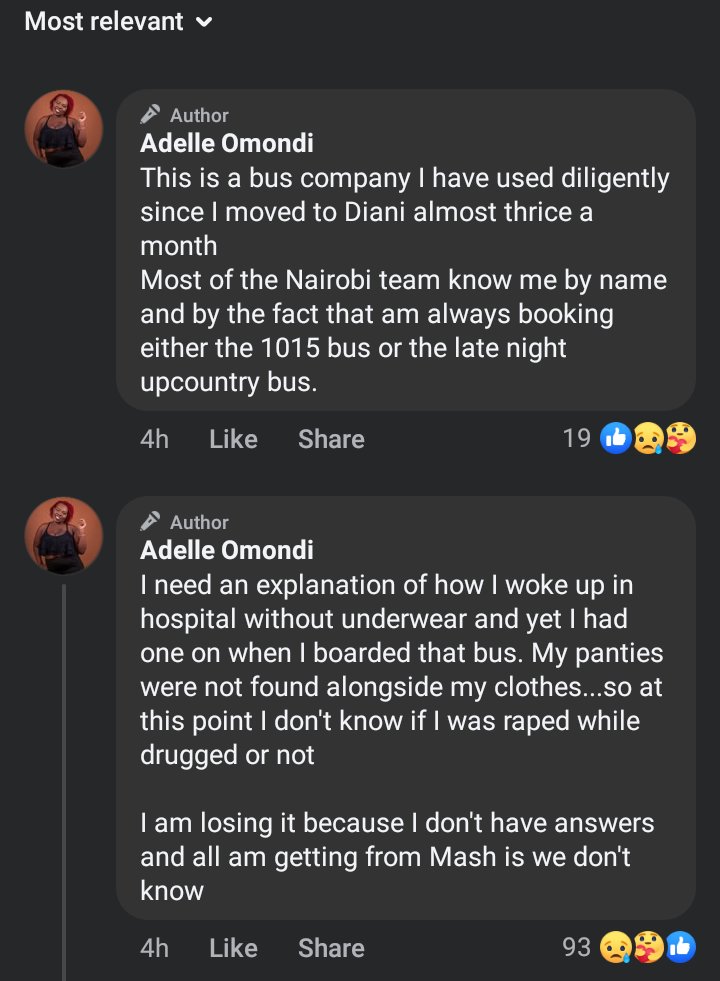It is becoming increasingly clear that passengers using long-distance buses to the Kenyan coast face real risks, especially on buses like Mash Poa. The recent experience shared by Adelle Omondi has shocked the public, but sadly, her story may only be the tip of the iceberg.
Adelle was traveling from Nairobi to Mombasa on a Mash Poa bus, a trip she had taken many times before. However, this time, things went terribly wrong. She woke up two days later at Coast General Hospital, without any of her valuables and in an alarming state.
She had been drugged, her panties were missing, and her money and belongings had all been stolen. What made it worse was the silence and coldness she received from those supposed to help her.

Adelle sat in seat 37, and her seatmate was in seat 38. Naturally, she expected the bus company to at least provide information about the person who had sat next to her. Instead, Mash Poa claimed they had no details of the seatmate.
This is highly suspicious. How can a company that books hundreds of passengers every day not have basic records of who sat where? This response alone suggests a careless or even shady booking system that fails to protect travelers.

It raises the serious question, are these drugging incidents simply cases of bad luck, or is there a deeper network preying on vulnerable passengers with the help of negligent bus companies? Coast General Hospital’s reaction made the situation even worse.
Adelle said the hospital told her such cases were common and then asked her to leave. Imagine being a drugging victim, waking up in a strange place, with no help, and then being told this is normal. This is not normal.
It should never be treated as normal. Hospitals and transport companies alike seem to have adopted a culture of brushing aside these crimes as routine, and that kind of attitude is dangerous.
Other Kenyans, like Eunice Keter, have taken to social media demanding justice for Adelle and many other silent victims. They want to know why Mash Poa is hiding the identity of Adelle’s seatmate.
They want to know who undressed her, who took her valuables, and why a hospital like Coast General cannot treat a drugging case with the seriousness it deserves. These are not minor issues. They represent a failure at multiple levels, transport, medical care, and law enforcement.

Mash Poa cannot continue operating as if it bears no responsibility. If they cannot guarantee the safety of their passengers, then they should not be in the business of transporting people.
Their refusal to share information points to either gross negligence or possible collusion in covering up criminal acts. Every seat on a bus should be linked to an identity.
If someone drugs or harms another passenger, the company should be able to help police trace them. But in this case, the company turned its back on the victim.
The National Police Service of Kenya must step in and investigate these cases with urgency. This is no longer just about Adelle. It is about the safety of every Kenyan traveling by bus, especially along the coast route.
The pattern of druggings and the dismissive responses from both Mash Poa and Coast General show that the system is broken. Authorities cannot continue looking the other way while passengers are assaulted, robbed, and abandoned.Until real action is taken, buses like Mash Poa will continue to operate with impunity. Victims like Adelle will continue to suffer in silence, and predators will keep using public transport as their hunting ground.
Kenya must do better. Travelers deserve safety, dignity, and justice. The silence must end, and accountability must begin.





















Add Comment